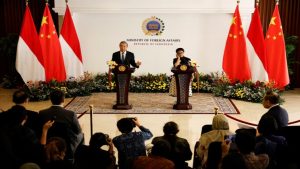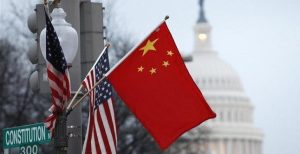For anyone interested in observing and understanding China, the annual “Two Sessions” is a political event of great significance. It is an important window of opportunity to learn about China’s present-day socio-economic development.
It is also an event that lays bare China’s political architecture and also maps the way forward that gives hint into the envisaged future and desired role in global affairs. China’s “Two Sessions” matter to the world due to its superpower status whose economy is second only to that of the US and all projections are that at the rate of its current rapid growth, China will within the next decade overtake the US to become the world’s biggest economy.
Among the conclusions of the “Two Sessions” was that “the country’s economy can expect an upturn on the whole, and there is a high probability that the growth rate will hit its normal level”. Furthermore, China has quietly developed into the world’s most promising market. The country boasts a middle-income population of over 400 million. Some agencies forecast that this figure will surpass 800 million within the next 15 years.
After the IMF lifted its forecast of China’s economic growth rate for 2023 to 5.2 percent, the IMF’s Managing Director Kristalina Georieva was quoted as saying “it is highly likely that China’s development will be the most important factor in driving global growth in 2023”.
The UN has also heaped praise on China’s achievement of achieving a crucial Millennium Goal, that of poverty eradication and not poverty alleviation. A number of happiness index have also shown China’s population to be amongst the happiest in the world. This is unsurprising, majority of working population has more than one job at a time and the overall cost of living is favourable.
The meeting of the 14th National Committee of the Chinese People’s Political Consultative Conference (CPPCC) was held on March 4 at the Great Hall of the People in the capital, Beijing. The CPPCC is known as the “political advisory body”, whereas the National People’s Congress is regarded as country’s top legislative assembly. This is democracy with Chinese characteristics.
The “Two Sessions” is embraced as a platform where different regions and indeed different groups of Chinese society put their opinions, views, concerns and proposed solutions on the table, before everybody. The objective is to debate and reach a consensus. Law-makers are known to submit motions and suggestions, and political activists and advisors are known to offer insights and proposal that could be factored in the existing or future legislations.
The “Two Sessions” is probably the most important date to underscore in the country’s annual calendar. Over the years, it has proven to work effectively as “a platform that facilitates the resolution of practical problems that are faced by ordinary Chinese”. This could be, for instance, the building of roads in the countryside and rural areas, improvement of education system, or how to protect the rights of deliverymen as well as the lowest-paid employee in the workplace.
The origins many laws that govern China today have their origins in the “Two Sessions”. They were originally contained in the motions and proposals submitted by lawmakers and political advisors at the annual gathering. Laws such as the environmental protection, poverty eradication and health care could only be passed after being debated in the “Two Sessions”.
During this period, international development practitioners and foreign policy monitors are treated to a wide variety of China’s priority objectives – from domestic to global affairs.
Here at home, the nearest similarity to China’s “Two Sessions” could be the ruling ANC’s annual January 8 statement but coupled with the five-yearly policy conference that set the direction for the party domestically and internationally.
This story of the “Two Sessions” is made particularly important by the cantankerous geopolitics of our times, which are characterised by the slow death of multilateralism. The Ukraine war has reconfigured global relations forever. Relations between the global south and global north continue to drift apart – based on ideologies – and the economic stranglehold of the richer nations at the expense of the poorer ones is stark.
The old-age cry by the weaker nations of the global south, including South Africa, for the UN Security Council to be reformed continue to fall on deaf ears. Meanwhile, the credibility of the UN system, founded after the end of World War II in 1945, is gradually diminishing due to the growing unipolar world order led by the West. They’ve dubbed it the “rules-based world order” – their rules, that is.
China’s rapid rise in world politics is vitally important in this light. It carries the collective weight of support and expectation from the global south to challenge the hegemony of the US and its Western allies, notably the European Union and NATO.
To observe China’s “Two Sessions” take stock of China’s sprawling economy and global political influence, or impact.
One of the main objectives of this important annual gathering that is attended by people from all walks of life – from the top lawmakers and politicians to ordinary men and women – is to debate and set the country’s growth target and pronounce on the macro-economic policies as well as foreign policy.
All these deliberations and resolutions are contained in a widely-publicised document known as the “government work report” that provide answers to all questions.
International relations observers pay full attention to China’s “Two Sessions” in order to understand the country’s economic plans, political direction and geopolitical posture.
The fact that China has remained true and steadfast to its close bilateral ties with Russia in a “no-limits relationship” is of a major concern to the West, which has failed to draw Beijing on its anti-Russian economic sanctions.
One common thread that runs through the “Two Sessions” and other gatherings of importance such as the Politburo of the Communist Party of China (CPC) is “the advancement of the rejuvenation of the Chinese nation on all fronts through a Chinese path to modernization”. No wonder that in today’s world and terms, what matters to China must, and does matter to the rest of the world.
China’s Foreign Minister, Qin Gang, who is also former China’s ambassador to the US, is expected to steer his country safely through very unpredictable China-US bilateral relations.
Speaking after the “Two Sessions” Minister Qin said: “As the world is undergoing major changes unseen in a century, China will continue to pursue the independent foreign policy of peace and will continue to implement the mutually beneficial strategy of opening –up. China will always be a builder of world peace, a contributor to global development, and a defender of the international order.”
The rise of China has caused the entire global community to look to the East for a secured future that promises mutual economic development and cooperation.






